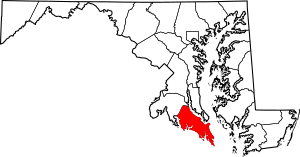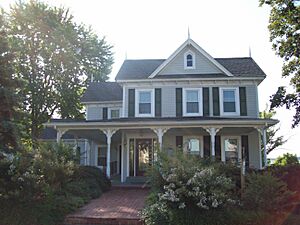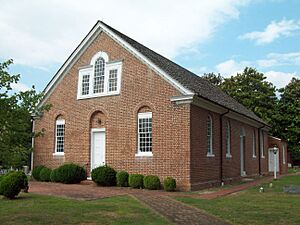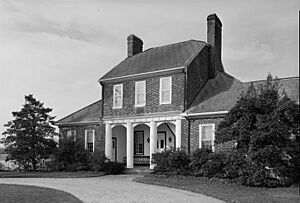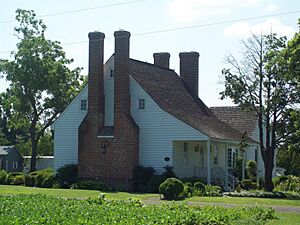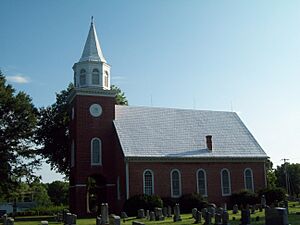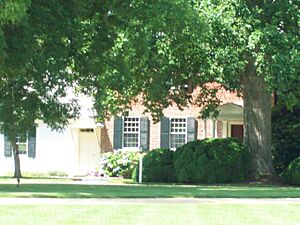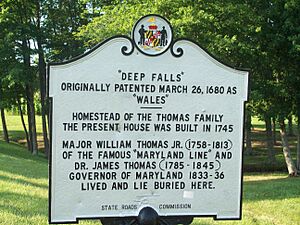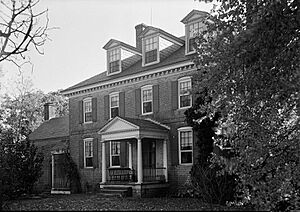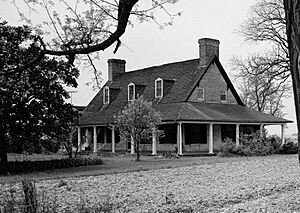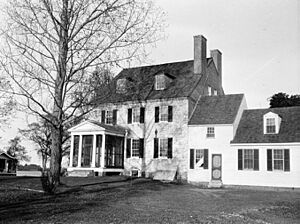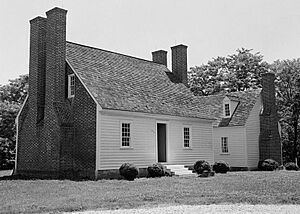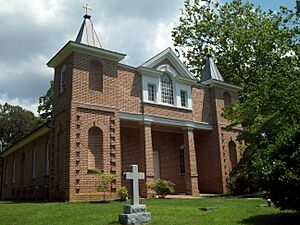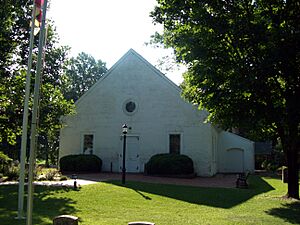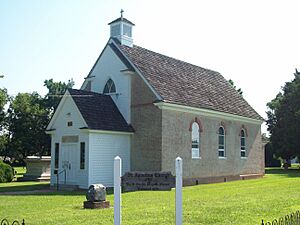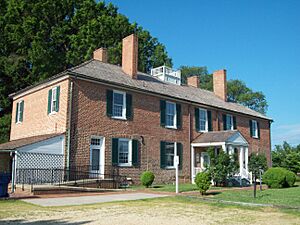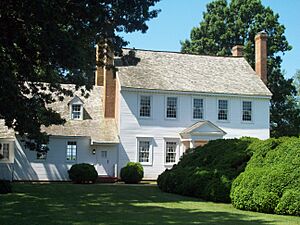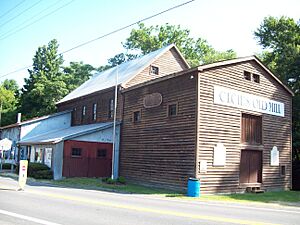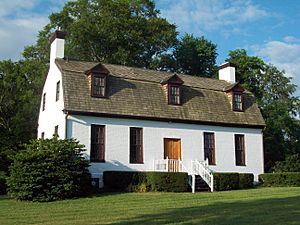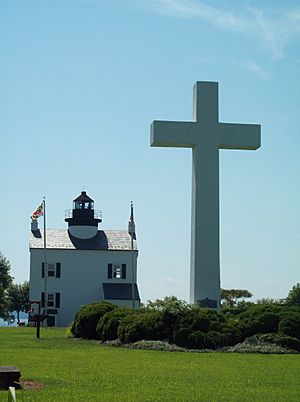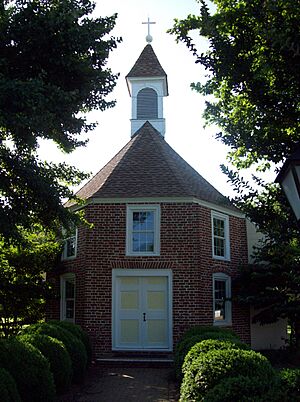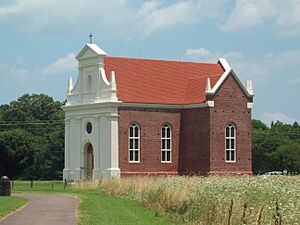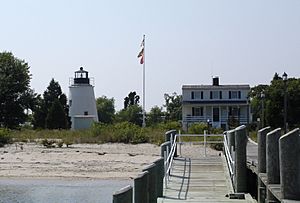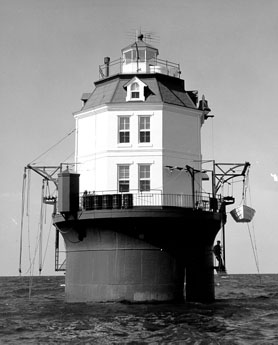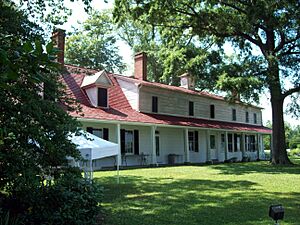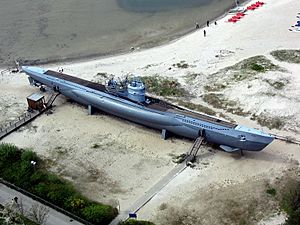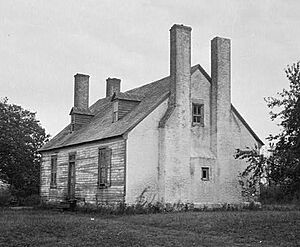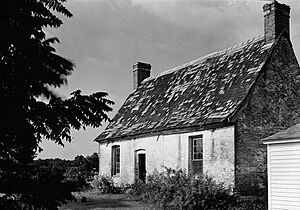National Register of Historic Places listings in St. Mary's County, Maryland facts for kids
Welcome to St. Mary's County, Maryland! This area is full of amazing history, and many of its special places are protected on the National Register of Historic Places. This list is like a hall of fame for buildings, sites, and districts that are important to American history, architecture, archaeology, engineering, or culture. When a place is on this list, it means it's recognized as a valuable part of our past and is worth preserving for future generations.
In St. Mary's County, there are 32 different properties and areas that have made it onto this important list. Three of these are even more special: they are called National Historic Landmarks, which means they have national importance!
Contents
- Exploring St. Mary's Historic Treasures
- Historic Homes and Buildings
- Abell House
- All Faith Church
- Bachelor's Hope
- Bard's Field
- Buena Vista
- Christ Episcopal Church
- Cross Manor
- Deep Falls
- Mulberry Fields
- Ocean Hall
- Porto Bello
- Sandgates On Cat Creek
- St. Andrew's Church
- St. George's Protestant Episcopal Church
- St. Ignatius Roman Catholic Church
- St. Richard's Manor
- Tudor Hall
- Woodlawn
- Historic Districts and Sites
- Unique Historic Listings
- Former Listings
- Historic Homes and Buildings
Exploring St. Mary's Historic Treasures
Let's discover some of the cool historic places you can find in St. Mary's County. Each one tells a unique story about Maryland's past.
Historic Homes and Buildings
Many of the places on the National Register are old homes or churches that show us how people lived and built things long ago.
Abell House
The Abell House in Leonardtown is a beautiful home built in 1910. It's designed in the Queen Anne style, which means it has lots of fancy details, like towers, turrets, and decorative shingles.
All Faith Church
Near Charlotte Hall, you'll find All Faith Church. This church was built between 1766 and 1769 in the Georgian style. Georgian buildings are known for being very balanced and grand, often with tall windows and a strong, simple shape.
Bachelor's Hope
Bachelor's Hope in Chaptico is an 18th-century brick house. It was built using a special design called the "Great Hall" plan, which was common for large homes back then.
Bard's Field
Bard's Field, located near Ridge, is an early 19th-century house made of wood. It has two chimneys on the outside ends, which was a popular design feature.
Buena Vista
Buena Vista in Leonardtown is a wooden house built between 1840 and 1850. It's designed in the Greek Revival style, which means it looks a bit like ancient Greek temples, with columns and a grand entrance.
Christ Episcopal Church
The Christ Episcopal Church in Chaptico is a brick church built in 1736. Imagine how many generations of people have worshipped in this very building!
Cross Manor
Cross Manor in St. Inigoes is a historic home built around 1789. It had more parts added during the 1800s, showing how it changed over time.
Deep Falls
Deep Falls near Chaptico is a dwelling that was reportedly built in 1745. It was the family home for the descendants of James Thomas, who was a Governor of Maryland.
Mulberry Fields
Mulberry Fields near Beauvue is a grand brick house built around 1763. It's a great example of a Georgian-style mansion.
Ocean Hall
Ocean Hall in Bushwood is believed to have been built around 1670, making it one of the oldest homes on the list!
Porto Bello
Porto Bello near Drayden is a brick house built after 1742. It's another example of the beautiful architecture from that time.
Sandgates On Cat Creek
Sandgates On Cat Creek near Oakville is a wooden house with brick ends. It was built between 1740 and 1780.
St. Andrew's Church
St. Andrew's Church near Leonardtown is a rectangular brick church designed in 1766. It's a classic example of church architecture from that period.
St. George's Protestant Episcopal Church
St. George's Protestant Episcopal Church near Valley Lee is a brick church built in 1799. It's thought to be the site of the oldest Anglican church in Maryland that still has an active parish today!
St. Ignatius Roman Catholic Church
The St. Ignatius Roman Catholic Church in St. Inigoes was built between 1785 and 1787. A sacristy (a room where sacred items are kept) was added in 1817.
St. Richard's Manor
St. Richard's Manor in Lexington Park is a brick house built before 1750, right on the Patuxent River.
Tudor Hall
Tudor Hall in Leonardtown is a Georgian brick building from about 1798. Today, it's home to the St. Mary’s County Historical Society, which helps preserve and share the county's history.
Woodlawn
Woodlawn near St. Mary's City is an 18th-century wooden house built in the Federal style. This style was popular after the American Revolution and often features elegant, simple designs.
Historic Districts and Sites
Some listings are entire areas or sites that hold a lot of history.
Cecil's Mill Historic District
The Cecil's Mill Historic District near Great Mills includes an old mill, a general store, a home, and an abandoned Catholic church. It shows what a small community might have looked like long ago.
Charlotte Hall Historic District
The Charlotte Hall Historic District includes what's left of the Charlotte Hall Military Academy and other local buildings. This district tells the story of a historic school and the town around it.
St. Clement's Island Historic District
St. Clement's Island Historic District near Coltons Point is a very important place! It's where the first settlers of Maryland landed in 1634. Imagine stepping onto the land where Maryland's history truly began.
St. Francis Xavier Church and Newtown Manor House Historic District
This district near Compton is important for understanding the early history of the Catholic Church in Maryland. It was a self-supporting community run by Jesuits (a religious order) on a large farm.
St. Marys City Historic District (National Historic Landmark)
The St. Marys City Historic District is a National Historic Landmark and a super important site! This was the very first English settlement in Maryland, founded in 1634. It was also the capital of Maryland until 1695. Exploring this area is like stepping back in time to the earliest days of the colony.
Unique Historic Listings
Some listings are not buildings but are still incredibly important pieces of history.
Piney Point Coast Guard Light Station
The Piney Point Coast Guard Light Station near Piney Point is a lighthouse built in 1836. Lighthouses are like beacons, guiding ships safely. This one was used until 1964 and is now a museum where you can learn about its history.
Point No Point Light Station
The Point No Point Light Station near Dameron is another lighthouse, built in 1902 and first lit in 1905. It became automated in 1938, meaning it could operate without someone living there all the time.
Sotterley (National Historic Landmark)
Sotterley in Hollywood is a National Historic Landmark! The oldest part of this dwelling was built in 1703. It's now owned by the National Trust, which works to protect historic places. Sotterley offers a glimpse into different periods of American history, including colonial life and the lives of enslaved people.
U-1105 BLACK Panther (Type VIIC German Submarine)
This is a really unique listing! The U-1105 BLACK Panther is a German U-Boat (submarine) from World War II. Its wreck is located in the Potomac River near Piney Point. It's Maryland's first historic shipwreck preserve, meaning it's protected underwater for people to learn about.
West St. Mary's Manor (National Historic Landmark)
West St. Mary's Manor near Drayden is another National Historic Landmark. This early Colonial-era house was built between 1700 and 1730. It's a fantastic example of homes from the very early days of Maryland.
Former Listings
Sometimes, a place might be removed from the National Register, usually because it was damaged or destroyed.
Resurrection Manor
Resurrection Manor near Hollywood was once on the list but was later removed because it was demolished.


